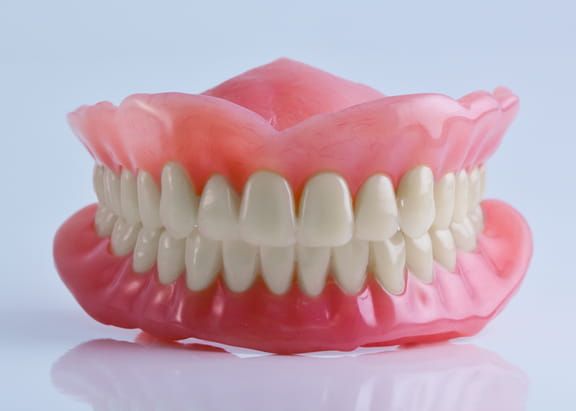NOBSCOTDENTAL CARE
REZA M. MADANI, DMD, FAGD
Dentures

Occasionally, it is difficult to adapt to full or partial dentures. At first they may feel loose, bulky and awkward while speaking. For a quicker adjustment period, follow these instructions:
1) At first, wear your dentures all the time.
2) Do not use adhesive unless Dr. Madani advises you to do so.
3) You should remove your dentures when you go to sleep.
4) After removing dentures, clean with a toothbrush and place in a bowl of water. They can be soaked in a commercial denture cleanser, but brushing them is essential.
5) Any signs of "sore spots," discomfort, or looseness that is causing you difficulty should be brought to our attention.
Never adjust the dentures yourself. Every person and every mouth is different; therefore, adjustment periods will vary.
Please remember that it will take time for you to become completely comfortable with your new teeth.
A full arch denture is a removable tooth replacement option for those who need all their teeth replaced. They can be crafted to provide the characteristics (tooth shape and color) the patient desires. Advances have been made in the materials used for dentures and in the way they are designed. If you already have dentures (partial or full arch) you may be experiencing a loose fit or denture slipping. This can lead to gum sores, can affect your chewing and your speech and decrease your confidence when speaking and/or laughing with others. We can help restore your dentures to the correct fit.
This prosthesis is used in special situations for patients who have enough bone in the anterior regions of the lower or upper jaws, but limited amount of bone in the posterior regions and are not candidates for extensive bone grafting.
This type of denture is made to be placed in the mouth immediately after you have all your natural teeth extracted. This allows you to leave the office without the embarrassment of having no teeth while the gums heal from the extraction. The denture is made to conform to your mouth at the moment impressions were taken. Your gums will change drastically over the next few months and it is possible that the dentures will rub against the gums causing some soreness until the denture is adjusted. Most patients will require a realignment of their denture within the first few months due to the gums shrinking from the extraction of teeth. Another benefit of immediate dentures is the fact that the dentures act as a bandage to the extraction sites which covers the tooth sockets and prevents them from becoming irritated. Just remember, never remove the denture yourself, even for a brief moment unless your dentist has instructed you to. The gums have a tendency to swell when uncovered at first; and if you are without your dentures for a little while, they may never go back in.
Our office provides smile makeovers to achieve the beautiful, natural look you seek. We can reshape your natural teeth to make them straighter or more youthful in appeal. Our offices is easily accessible and makes it convenient to those living in Framingham to get the care they deserve.
Make an Appointment
Call Us Today
(508) 877-0800
Implants allow you to wear full dentures and partial dentures without fear that they will slip or fall out. A "snap-in" denture is an implant supported, removable denture. The snap-in feature is available for upper or lower dentures. Having implant supported dentures allows for the base of the denture to be made much smaller and more comfortable. Implant supported dentures enhance chewing and speaking. Never again will you have to worry about your teeth falling out when you eat, laugh or speak. You will regain chewing function and enjoy some forgotten foods.
An over denture fits on top of natural teeth or dental implants. Many patients suffer with ill fitting and loose dentures that move or even fall out when speaking or eating. One way of solving this problem is to construct a dental plate that goes over and attaches to something underneath it. Keeping a few natural teeth or placing dental implants in the bone under the denture also helps keep the jaw bone healthy. This avoids much of the natural jaw bone loss often seen after teeth are removed. Traditional over dentures go over natural teeth. A denture can be made that goes over and attaches to one or both cuspids. Implants supported over dentures fit on top of dental implants. A retainer bar or retention balls are placed on the implants and special attachments are inserted into the denture to grab onto these retention devices. A new method using mini implant dentures is becoming increasingly popular. Mini implants are very thin, long titanium implants that screw into the jaw bone. They can be placed and old dentures can often be retrofitted to the implant.
Partial dentures are used to replace missing teeth. Partials have metal hooks that grab onto the neighboring teeth for support. Unfortunately, the hooks have a tendency to loosen up the teeth. Partial dentures have the tendency to get loose and require multiple adjustments throughout the years. On the upper, there is a large piece of metal that goes across the roof of the mouth which can interfere with taste sensation and/or have food collected under it. Additionally, the partial plate can press into the gum tissue and cause sores. The partial dental plate must be taken in and out each day for cleaning. It is certainly not an ideal alternative.
Temporary or interim appliances serve many useful purposes and are often an integral part of a prosthetic treatment plan. These appliances can be designed to be either fixed or removable. This simple appliance is excellent for temporary replacement of front teeth while the patient is waiting for a permanent bridge, a partial, or implants. This removable interim bridge is made of a clear vacuum-formed material. The appliance simply snaps into place.
